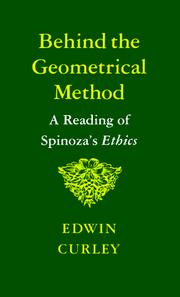| Listing 1 - 4 of 4 |
Sort by
|
Book
ISBN: 3110319853 9783110319859 9783110319330 3110319330 9783868381146 3868381147 1299721524 Year: 2011 Publisher: Heusenstamm Ontos
Abstract | Keywords | Export | Availability | Bookmark
 Loading...
Loading...Choose an application
- Reference Manager
- EndNote
- RefWorks (Direct export to RefWorks)
A revival of panpsychistic considerations of the mind's place in nature has recently enriched the debate on the mind-body problem in contemporary philosophy of mind. The essays assembled in the present collection aim to supply a positive contribution to these considerations, providing new perspectives on panpsychism by shedding new light on its arguments and impacts as well as on its problems and theoretical challenges. Panpsychism is discussed as a position that understands consciousness as a truly fundamental feature of our reality - not only with respect to the human species, but also with respect to the evolution of the universe as such.
Panpsychism. --- Animism --- Consciousness --- Philosophy --- Hylozoism --- Philosophical anthropology
Book
ISBN: 9780190859053 9780190859084 0190859083 0190859067 0190859059 Year: 2019 Publisher: New York, N.Y. Oxford University Press
Abstract | Keywords | Export | Availability | Bookmark
 Loading...
Loading...Choose an application
- Reference Manager
- EndNote
- RefWorks (Direct export to RefWorks)
This book explores a neglected philosophical question: How do groups of interacting minds relate to singular minds? Could several of us, by organizing ourselves the right way, constitute a single conscious mind that contains our minds as parts? And could each of us have been, all along, a group of mental parts in close cooperation? Scientific progress seems to be slowly revealing that all the different physical objects around us are, at root, just a matter of the right parts put together in the right ways: How far could the same be true of minds? This book argues that we are too used to seeing the mind as an indivisible unity and that understanding our place in nature requires being willing to see minds as composite systems, simultaneously one conscious whole and many conscious parts. In thinking through the implications of such a shift of perspective, the book relates the question of mental combination to a range of different theories of the mind (in particular panpsychism, functionalism, and Neo-Lockeanism about personal identity) and identifies, clarifies, and addresses a wide array of philosophical objections (concerning personal identity, the unity of consciousness, the privacy of experience, and other issues) that have been raised against the idea of composite minds. The result is an account of the metaphysics of composition and consciousness that can illuminate many different debates in philosophy of mind, concerning split brains, collective intentionality, and the combination problem, among others.--publisher.
Philosophical anthropology --- Theory of knowledge --- Panpsychism. --- Subjectivity. --- Consciousness. --- Metaphysics.

ISBN: 0262195224 0262693518 0262283735 1423726642 9780262283731 9781423726647 9780262693516 9780262195225 Year: 2005
Abstract | Keywords | Export | Availability | Bookmark
 Loading...
Loading...Choose an application
- Reference Manager
- EndNote
- RefWorks (Direct export to RefWorks)
In Panpsychism in the West, the first comprehensive study of the subject, David Skrbina argues for the importance of panpsychism--the theory that mind exists, in some form, in all living and nonliving things--in consideration of the nature of consciousness and mind. Despite the recent advances in our knowledge of the brain and the increasing intricacy and sophistication of philosophical discussion, the nature of mind remains an enigma. Panpsychism, with its conception of mind as a general phenomenon of nature, uniquely links being and mind. More than a theory of mind, it is a meta-theory--a statement about theories of mind rather than a theory in itself. Panpsychism can parallel almost every current theory of mind; it simply holds that, no matter how one conceives of mind, such mind applies to all things. In addition, panpsychism is one of the most ancient and enduring concepts of philosophy, beginning with its pre-historical forms, animism and polytheism. Its adherents in the West have included important thinkers from the very beginning of Greek philosophy through the sixteenth and seventeenth centuries to the present.Skrbina argues that panpsychism is long overdue for detailed treatment, and with this book he proposes to add impetus to the discussion of panpsychism in serious philosophical inquiries. After a brief discussion of general issues surrounding philosophy of mind, he traces the panpsychist views of specific philosophers, from the ancient Greeks and early Renaissance naturalist philosophers through the likes of William James, Josiah Royce, and Charles Sanders Peirce--always with a strong emphasis on the original texts. In his concluding chapter, "A Panpsychist World View," Skrbina assesses panpsychist arguments and puts them in a larger context. By demonstrating that there is panpsychist thinking in many major philosophers, Skrbina offers a radical challenge to the modern worldview, based as it is on a mechanistic cosmos of dead, insensate matter. Panpsychism in the West will be the standard work on this topic for years to come.
Philosophical anthropology --- Esoteric sciences --- Panpsychism --- History. --- History --- Animism --- Consciousness --- Philosophy --- Hylozoism --- COGNITIVE SCIENCES/General --- COGNITIVE SCIENCES/Psychology/Cognitive Psychology

ISBN: 9780691020372 9780691073224 069102037X 0691073228 0691214263 Year: 1988 Publisher: Princeton, N.J. Princeton University Press
Abstract | Keywords | Export | Availability | Bookmark
 Loading...
Loading...Choose an application
- Reference Manager
- EndNote
- RefWorks (Direct export to RefWorks)
This book is the fruit of twenty-five years of study of Spinoza by the editor and translator of a new and widely acclaimed edition of Spinoza's collected works. Based on three lectures delivered at the Hebrew University of Jerusalem in 1984, the work provides a useful focal point for continued discussion of the relationship between Descartes and Spinoza, while also serving as a readable and relatively brief but substantial introduction to the Ethics for students. Behind the Geometrical Method is actually two books in one. The first is Edwin Curley's text, which explains Spinoza's masterwork to readers who have little background in philosophy. This text will prove a boon to those who have tried to read the Ethics, but have been baffled by the geometrical style in which it is written. Here Professor Curley undertakes to show how the central claims of the Ethics arose out of critical reflection on the philosophies of Spinoza's two great predecessors, Descartes and Hobbes. The second book, whose argument is conducted in the notes to the text, attempts to support further the often controversial interpretations offered in the text and to carry on a dialogue with recent commentators on Spinoza. The author aligns himself with those who interpret Spinoza naturalistically and materialistically.
Spinoza, Baruch --- Ethics --- Spinoza, Benedictus de, --- Ethics. --- Deontology --- Ethics, Primitive --- Ethology --- Moral philosophy --- Morality --- Morals --- Philosophy, Moral --- Science, Moral --- Philosophy --- Values --- Ethik. --- Spinoza, Baruch. --- Spinoza, Baruch; Ethica. --- God. --- Hobbes, Thomas. --- affects. --- attribute. --- body. --- conatus. --- determinism. --- egoism. --- essence. --- explaoation. --- exteosion. --- freedom. --- friendship. --- humility. --- idea. --- immutability. --- joy. --- knowledge. --- laws of nature. --- materialism. --- monism. --- motion. --- necessity. --- nobility. --- omniscience. --- panpsychism. --- parallelism. --- physics. --- power. --- real distinction. --- reason. --- sadness. --- skepticism. --- substance. --- teleology. --- utility. --- whole of nature. --- Ethische Theorie --- Moral --- Philosophische Ethik --- Sittenlehre --- Moralphilosophie --- Ethiker --- Praktische Philosophie --- Theorie --- Morale. --- Spinoza, Baruch,
| Listing 1 - 4 of 4 |
Sort by
|

 Search
Search Feedback
Feedback About UniCat
About UniCat  Help
Help News
News